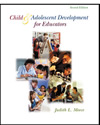 |  Child and Adolescent Development for Educators, 2/e Judith Meece,
University of North Carolina - Chapel Hill
Student Study Guide by Nancy Defrates-Densch
Studying Children's Development
Learning ObjectivesAfter studying this chapter, you should be able to:
| Explain the importance of studying child development for teachers. |
 |  |  | | Describe four different views of children's development and explain how differing views may influence teacher practice. |
 |  |  | | Discuss the influences schools have on children's cognitive, social, and emotional development. |
 |  |  | | Describe how our ideas about childhood and children are shaped by social, economic, and historical circumstances. |
 |  |  | | Discuss current demographic trends occurring with children in our society and how these trends will affect schools in the future. |
 |  |  | | Explain the importance to teachers of being knowledgeable about various theories of child development. |
 |  |  | | Describe the issues of debate in child development. |
 |  |  | | Describe the major theoretical perspectives on child development and the assumptions underlying each. |
 |  |  | | Identify the advantages and disadvantages of different research designs and data collection methods. |
 |  |  | | Identify what to look for when judging the quality of a study. |
 |  |  | | Describe the ethical guidelines that must be followed in research studies involving children and adults. |
|



 2002 McGraw-Hill Higher Education
2002 McGraw-Hill Higher Education